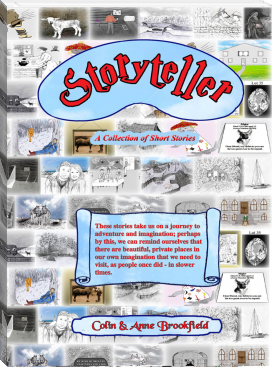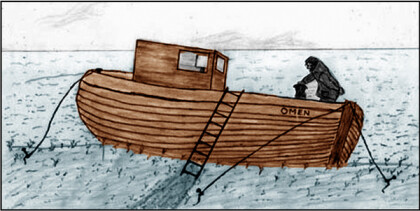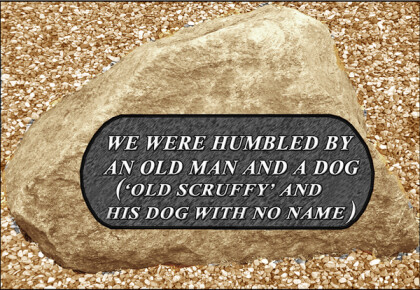Storyteller, Colin & Anne Brookfield [best fiction books to read .TXT] 📗

- Author: Colin & Anne Brookfield
Book online «Storyteller, Colin & Anne Brookfield [best fiction books to read .TXT] 📗». Author Colin & Anne Brookfield
He was just an old black mongrel dog who lived by his wits and slept where he could. He kept his distance from trouble, but nevertheless it frequently caught up with him. It seemed this was the unfair deal that came with having no permanent home. There was no-one to take care of him or give him a name.
Surprisingly though, there seemed to be one person in his life; a man the locals referred to disdainfully as ‘Old Scruffy’.
Scruffy lived on his small fishing boat named Omen, and like the old man, it had seen better times. It was often said that Scruffy and the dog were one and the same ‘under the skin’, and therefore it was not surprising that they should be drawn together.

These were tough times during the 1940s when the world’s nations had been thrown against one another in bitter conflict.
Then, in England’s darkest hour, the call came for all small boats on the Eastern Seaboard to assemble for the rescue of beleaguered British soldiers from the beaches of Dunkirk. Most of the town had gathered to see their small boats leaving harbour for the official marshalling areas.
The following days were filled with anxiety for the families of those imperilled at sea, and the newspapers and cinemas were full of the evacuation deeds of courage.
When at last there were no more that ships could do, the surviving small boats were asked to return to their home ports.
Amongst the published names of small boats lost, and stories of heroism relating to each of them, was one concerning the repeated and outstanding bravery of an old man and a black dog on their small boat, the Omen. Many wounded soldiers told how they had been saved from drowning by a black dog that had dragged them towards the old man’s boat.
The reporter had gone on to say, that the sinking Omen had been found several days later by a Royal Navy frigate, but the dog and old man were never found.
A footnote mentioned the strangeness of the small boat’s name, ‘Omen’, and that if the name were reversed it spelt the Latin word ‘Nemo’, meaning ‘Nobody’.
There is now a memorial in the gardens of the Town Square and embossed on the bronze plaque are the words:
We were humbled by an old man and a dog (‘Old Scruffy’ and his dog with no name).

Peter stared forlornly at the television and muttered to himself, “Damn garage, full of promises, what a joke. Here I am with no car, and no holiday either, if my promised lift to Shropshire in the morning turns out to be as reliable as the garage.”
“I hope you’re going to put the garage and work out of your mind for the next few weeks,” said his wife Jill as she bustled into the room, bearing a tray of coffee and biscuits. “Darling, I wish you wouldn’t wear that vulgar ring,” she added with a slight grimace.
“I really should wear it for a while Jill, after all, it’s scarcely a month since my grandfather passed away and it was a thoughtful present. Besides, there’s a real gold sovereign set within it.”
“I don’t care! You’re not a barrow boy. Now, perhaps it might be an idea if we check through the holiday itinerary,” she said while pressing the ‘off’ button on the television remote, and withdrawing a neatly folded sheet of paper from the further side of the coffee tray. “I had a word with George today about giving you a lift to Shropshire during his weekly business trip there, and I must say, he was rather envious of your week’s fishing trip. However, he sees no problem about tomorrow morning, even though it’s slightly off his usual course to your drop-off point. He’ll be here at seven-thirty and suggested you both have breakfast along the way.”
“It makes sense,” Peter replied, “anyway, it will give me an opportunity to fill your brother’s petrol tank; I already feel guilty about my heavy cases and fishing tackle cluttering up his car boot space.” He put his cup down. “To be on the safe side, I’d better jot down a few details in my notebook. Now, according to the country cottage brochure, Bramble Lane should be approximately seven miles past the village on the right-hand side, and the cottage is about one hundred yards along the lane. I understand it’s occupied by an elderly couple.”
Jill moved the tray to one side, making room for Peter’s small notebook. “By the way,” she said, “make a note of our holiday flight times. We have to meet no later than eight thirty in the morning at Terminal Four at Heathrow on Friday the 24th, which is only about three and a half hours after George has delivered you back home from your fishing trip, and you will be very tired.”
She was feeling rather cross that her six day symposium in Brussels had clashed with the first week of Peter’s three week holiday. “Quite honestly Peter, I would have felt better knowing you were resting at home with a good book. At least then, I would know you hadn’t fallen into a river with your silly old fishing rod, or that you weren’t rolling about in the hay with the farmer’s daughter,” she said with a smile. “Oh well, at least we’ll get away to the sun for a few weeks afterwards.”
The following morning, after a parting kiss and some good advice to her husband about not sitting about fishing in the rain, Jill drove off to the airport and Peter embarked on the first stage of his holiday, with his brother-in-law chauffeur.
“Thanks for this George, I’d have been in rather a mess without your help, the garage promised me faithfully that the car would be ready, and then to be told at the last minute that it wouldn’t, really got matters off to a bad start. Though in the light of how things have turned out, it’s probably for the best. I don’t really need a car when I’m at the cottage.”
“Sounds a bit static,” George replied, with the village pub and the local brew uppermost in his mind, “it wouldn’t suit me, being without wheels.”
“To tell you the truth, I would normally feel the same way, but not this time. It may sound rather strange, but as I sat here watching the countryside slip by, my thoughts were on the things that my grandfather mentioned when I last visited him. You see, his words hadn’t struck home in the way they normally would, due to my rather overworked state of mind.” He took a moment to contemplate. “Grandfather was born in the very same Bramble Lane that we are going to, and who knows, perhaps our family name will still be known by someone, or the cottage might still be there.”
“Steady on old chap,” said George, “you sound as if you might be building yourself up for a bit of a disappointment.”
“You’re probably right. Grandfather had such an extraordinarily engaging way of putting things, that he did rather affect one’s imagination. He gave me a few sketches of his old hideaway fishing places around the mere and rivers, close to Bramble Lane. I hope they’re still there. From all accounts it’s supposed to be an isolated, but very beautiful place.”
Peter sat for a while wondering whether it would look the same now, as he settled more comfortably in his seat.
“I must say though, he was rather strange about the ring he gave me,” holding it up for George to see. “There was also some old money in a tiny drawstring bag. He said they all belonged together and asked me if I would wear the ring. Sounds silly I know, but I’ve brought the whole lot with me. He was a hundred and four, and passed away only two days after I saw him, so this is really something of a ‘sentimental journey’, visiting secret places that only he knew. I’m really going to miss that old fellow.”
The car slowed down and drew into the car park of a Shrewsbury hotel.
“We should be at your place within an hour or so,” said George encouragingly. “Fancy a sandwich? Must be two hours since we had breakfast.”
“Don’t know where you put it all. Though, a cup of coffee wouldn’t go amiss.”
George proved quite accurate in his estimate. Within an hour of leaving the hotel, they finally stopped by the side of, what could only have been Bramble Lane, and it corresponded with the seven miles past the village as instructed.
“I can see something in the hedge,” observed Peter, as he made his way towards it.
“What is it?” shouted George.
“It’s an old signpost, but most of the paint has peeled off. The word ‘lane’ is still readable but the first two letters of ‘Bramble’ have disappeared. We have evidently arrived at the right spot though,” Peter yelled.
“Alright, get in, and I’ll drive you down.”
“Not a good idea, it looks like a walking job,” Peter replied as he moved back towards the car. “There’s no way a car could get down this deeply rutted lane without parting company with the exhaust pipe and engine sump. Anyway George, many thanks, you’ve been great company. I promise to catch you a few trout, and no doubt you will have a few exaggerated fishing tales to listen to. Anyway, I suppose it’s time I made a move, I was told it’s only a hundred yards or so up the lane to the cottage, so I’ll see you on the twenty-fourth at the arranged time.”
“OK, see you in a week; have a good time,” George shouted as he drove off.
Picking up his fishing rod, he attached it to one of the cases with two elastic straps, and set off along the dusty track.
It soon became obvious that the only form of transport using the track must have been horse and cart; there were deep ruts either side of him, left by large iron-edged wooden wheels. There were also many indentations through the centre of the track, made by the hooves of a large draft horse.
After walking some half a mile with no sign of human habitation, Peter sat down for a rest on one of the cases. Close-by, he noticed a rusty, old cast iron water pump half covered with vegetation, protruding from the high hedgerow.
“The first sign of human existence!” he exclaimed out loudly, “Well passed existence.” He stood up and walked over to inspect it. Taking hold of the long, graceful cast iron handle, he eased it upward to see if the antique still worked. Its rusty parts let out a loud squeal of protest, and so did every bird within two hundred yards as they exploded from hedges and trees in alarm.
He let go, as though the handle had delivered an electric shock. “Hello countryside,” he said quietly, “the city has arrived.”
Then almost with a feeling of embarrassment, he lifted his belongings and removed himself from the scene of desecration.
Plodding on for another quarter of a mile did nothing for his rising feeling





Comments (0)